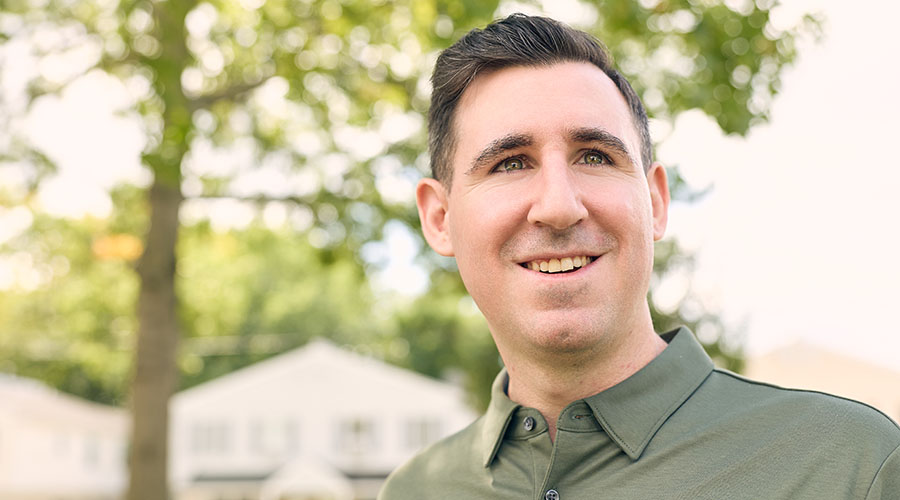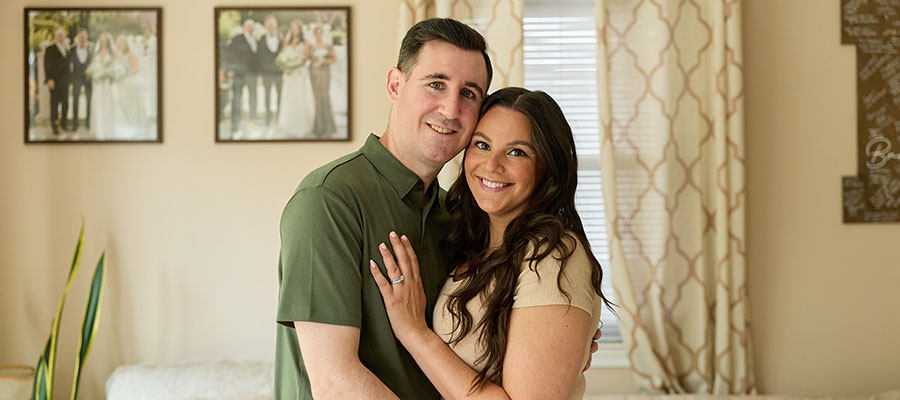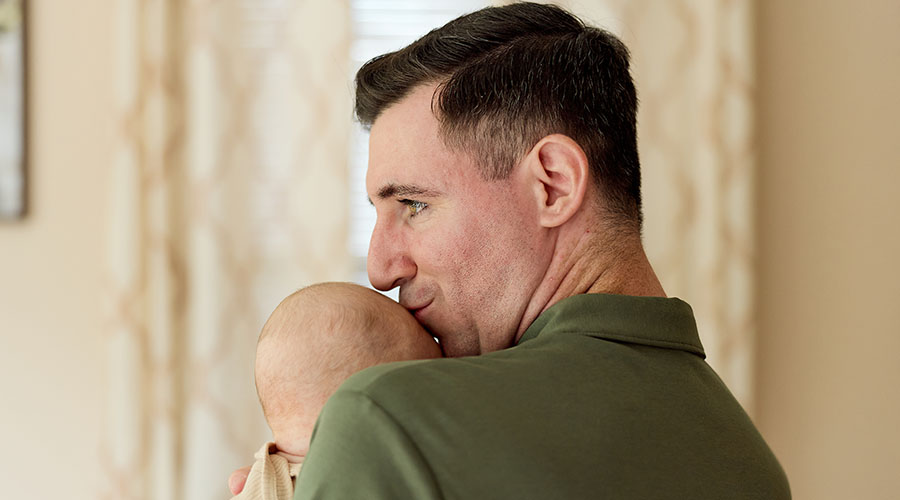Weather Alert: Following the winter storm, all Temple Health hospitals, campuses and clinical locations remain open, though some appointments or services may be adjusted. Patients will be contacted directly if their visit is affected. Please check TempleHealth.org or FoxChase.org for updates and monitor myTempleHealth for changes to scheduled appointments.
Breadcrumb
- Home
- Fox Chase Cancer Center News
- Protecting What Comes Next: When Cancer Occurs in the Prime of Life
Protecting What Comes Next: When Cancer Occurs in the Prime of Life

Cancer is often thought of as a disease of aging, yet more and more young adults in the United States are facing life-changing diagnoses in the prime of life. Amid this troubling trend, Fox Chase Cancer Center has launched a first-of-its-kind program in the Philadelphia area designed specifically to address the unique challenges of patients ages 18–39. Often, these patients are building careers, pursuing higher education, and wanting to start a family. While treatments can be lifesaving, they can also jeopardize the ability to have children.
“Fertility preservation isn’t just a medical issue—it’s a quality-of-life issue,” said Christopher Cann, MD, Director of Fox Chase’s new Young Adult Cancer Program. “Too often, these conversations never happen. We wanted to change that.”
When Cancer Disrupts Family Planning

For Josh Breen, the topic was impossible to ignore. In June 2024, while honeymooning in Italy with his wife, Sam, he found a large lump under his right armpit. Back home in Delaware County, he was diagnosed with stage 3 melanoma. His treatment plan called for immunotherapy—a newer cancer therapy with uncertain effects on long-term fertility.
While the prognosis was encouraging, the timing was devastating. Josh and Sam had been trying to conceive for more than a year.
“I spent one night crying all night because we didn’t know if we were going to be able to have babies after his cancer diagnosis,” Sam recalled. “We just had no idea what this would mean for our future family.”
They soon learned that while certain chemotherapies are known to be toxic to sperm, far less is understood about the fertility risks of immunotherapy. Many young adults in Josh’s situation never even get the chance to ask the question before starting treatment.
Turning Awareness into Life-Changing Impact
At Fox Chase, Dr. Cann and his colleagues recognized that fertility discussions between patients and care teams weren’t happening as consistently as they should. In July 2024, they implemented a Best Practice Advisory (BPA) into the electronic medical record system.
Now, whenever a provider orders chemotherapy or immunotherapy for a patient aged 18–50, the system prompts: “Would you like to refer this patient to the oncofertility team?”
This small intervention has had a dramatic impact. In just six months, oncofertility referrals increased by 450%, and 14 patients successfully preserved their fertility in that time—compared to only 22 over the previous five years.
The oncofertility team, comprised of nurses and social workers trained in fertility counseling, reaches out within 48 hours to explain preservation options, discuss costs, and help patients schedule appointments with local fertility clinics.
“The BPA integrates that reminder into the clinical workflow and makes referrals easier,” Dr. Cann explained. Ultimately, we want every patient of reproductive age to understand their options before starting cancer treatment.”
New Hope for Young Families

The resulting discussions are offering hope to families like the Breens.
After Josh was diagnosed, he froze his sperm before beginning immunotherapy. After treatment started, he and Sam pursued in vitro fertilization (IVF). By November 2024, they learned Sam was pregnant.
On July 1, 2025, she gave birth to their son, Logan.
“Everyone’s always like, ‘You don’t know the love for your own child until you have one.’ And it really is true,” Sam said.
Josh’s scans have been clear since May 2025. “I got to be here to take care of him and support my wonderful wife next to me,” he said. “I know others aren’t as fortunate.”
Expert Support for Navigating Challenges

Not all young adults have the same opportunity. Nationwide, studies show that up to 75% of young cancer survivors are concerned about fertility, yet as few as 28% receive information about treatment-related risks before therapy begins.
The barriers are many:
- Timing – Cancer treatment often needs to start quickly, leaving little room to plan fertility preservation.
- Cost – Egg freezing can cost upwards of $15,000, while sperm banking averages $500–$1,000 plus storage fees. Insurance coverage is inconsistent and often limited.
- Awareness – Many patients and even some providers don’t realize the potential reproductive risks, especially if treatment doesn’t directly involve reproductive organs.
Fox Chase’s Oncofertility Committee works to overcome these barriers by connecting patients with local specialists, fast-tracking appointments, and helping navigate financial options.
Easing the Burden With a Resource Network

Fertility is just one of the many concerns addressed through the Young Adult Cancer Program. Patients can access resources such as psychiatrists, social workers, financial counselors, and occupational therapists—along with support groups and social events designed for people facing cancer in early adulthood.
“This disease is hitting them in the prime of their lives,” Dr. Cann said. “Our goal is to give our patients the best comprehensive care by providing the supportive resources they need so they can have the bandwidth to focus on their treatment.”
The need for such programs is only growing. Between 2018 and 2022, Fox Chase treated 1,300 young adult cancer cases, reflecting a rise in aggressive cancers like breast and gastrointestinal cancers. And while research continues into possible causes—from environmental exposures to lifestyle factors—many cases occur in patients with no family history of cancer.
A National Model for Oncofertility Care
For young adults like Josh and Sam Breen, the combination of specialized care, proactive fertility discussions, and swift referrals can mean the difference between closing the door on having a family and holding a newborn in their arms.
Fox Chase hopes its approach will serve as a model for other institutions nationwide.
We’re seeing now more than ever that there is no such thing as ‘too young for cancer,’” Dr. Cann said. “Our hope is to meet the needs of every patient in this population—here in Philadelphia and beyond.”

Fox Chase Cancer Center (Fox Chase), which includes the Institute for Cancer Research and the American Oncologic Hospital and is a part of Temple Health, is one of the leading comprehensive cancer centers in the United States. Founded in 1904 in Philadelphia as one of the nation’s first cancer hospitals, Fox Chase was also among the first institutions to be designated a National Cancer Institute Comprehensive Cancer Center in 1974. Fox Chase is also one of just 10 members of the Alliance of Dedicated Cancer Centers. Fox Chase researchers have won the highest awards in their fields, including two Nobel Prizes. Fox Chase physicians are also routinely recognized in national rankings, and the Center’s nursing program has received the Magnet recognition for excellence six consecutive times. Today, Fox Chase conducts a broad array of nationally competitive basic, translational, and clinical research, with special programs in cancer prevention, detection, survivorship, and community outreach. It is the policy of Fox Chase Cancer Center that there shall be no exclusion from, or participation in, and no one denied the benefits of, the delivery of quality medical care on the basis of race, ethnicity, religion, sexual orientation, gender, gender identity/expression, disability, age, ancestry, color, national origin, physical ability, level of education, or source of payment.
For more information, call 888-369-2427